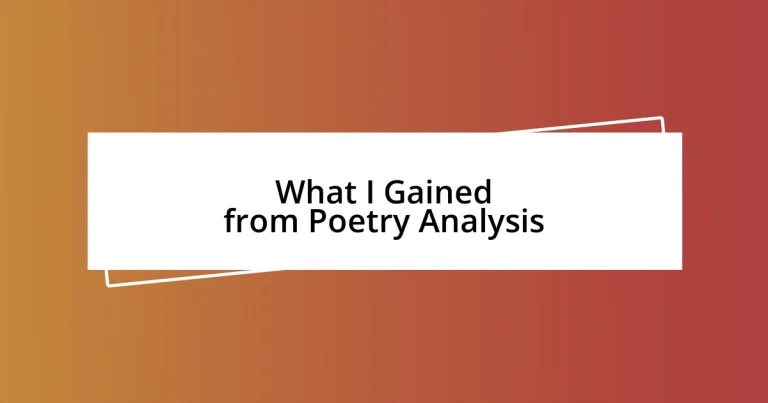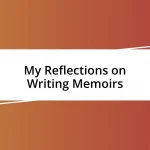Key takeaways:
- Poetry analysis enhances critical thinking and emotional intelligence by prompting deeper questioning and personal reflection on feelings.
- Engaging with diverse poetic voices fosters cultural awareness and challenges personal assumptions, revealing broader societal issues and experiences.
- Transforming analysis into creative expression allows for personal interpretation of poetry, enriching one’s writing and building connections with others through shared emotions.
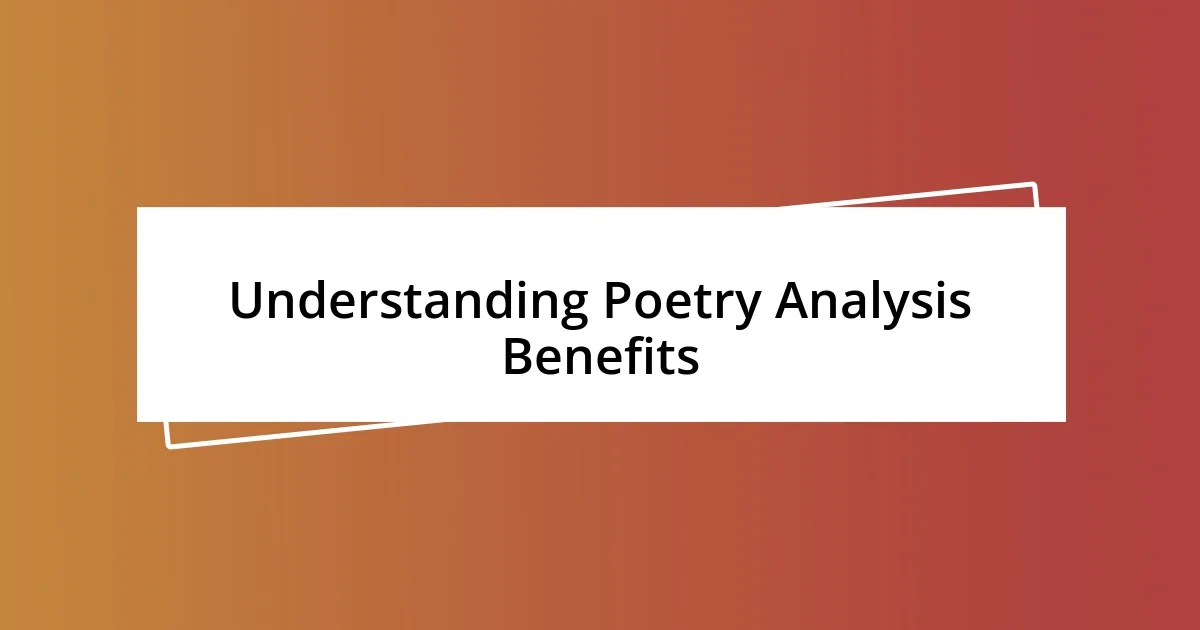
Understanding Poetry Analysis Benefits
One of the most significant benefits I discovered through poetry analysis is the way it sharpens my critical thinking skills. When I dive into a poem, I find myself asking questions like, “What is the poet really trying to convey?” This kind of questioning fosters deeper understanding, allowing me to not just scratch the surface, but to explore the layers beneath the words.
On a more personal note, poetry analysis has a unique way of enhancing my emotional intelligence. I remember dissecting a poem about loss and realizing how closely it resonated with my own experiences. This connection isn’t just theoretical; it grounded me in my feelings, and I emerged with a better understanding of both the poem and my own emotional landscape.
Additionally, engaging with poetry cultivates empathy. When I analyze diverse voices in poetry, I’m often transported into someone else’s world. Isn’t it fascinating how a few lines can help us walk in another person’s shoes? This ability to see life through varied perspectives enriches my own interactions and deepens my appreciation for the complexities of human experience.
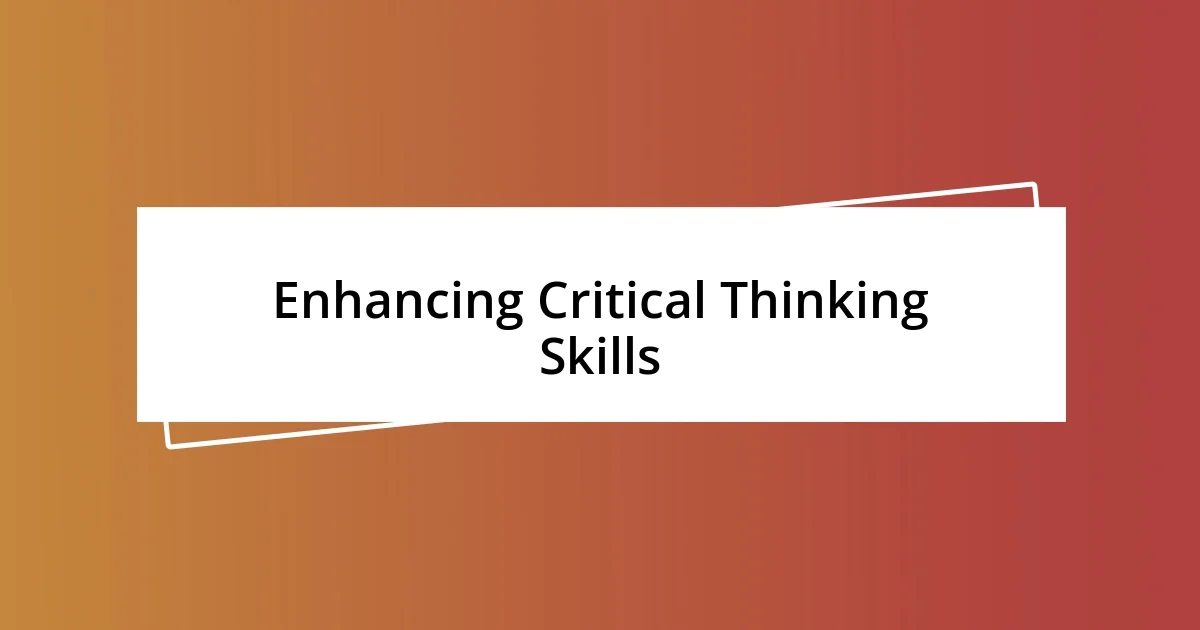
Enhancing Critical Thinking Skills
Engaging deeply with poetry has fundamentally transformed how I approach problems and ideas. Each analysis transforms a simple reading into a complex puzzle, where I deliberate on the elements of tone, symbolism, and structure. I often find myself reasoning through uncertainties, contemplating multiple interpretations until one resonates. For instance, I remember grappling with a particularly cryptic poem; the process required me to think laterally, connecting themes that weren’t immediately obvious. This experience taught me that solutions often lie beyond the first glance.
- It encourages questioning assumptions, making me evaluate my beliefs.
- I learn to analyze arguments, separate strengths from weaknesses.
- The exercise of interpreting metaphors sharpens my capacity for abstract thinking.
- Each poem serves as a case study, prompting me to assess various viewpoints critically.
- I gain confidence in articulating insights clearly, enhancing my communication skills.
These skills extend beyond poetry, enriching my daily life and academic pursuits alike.
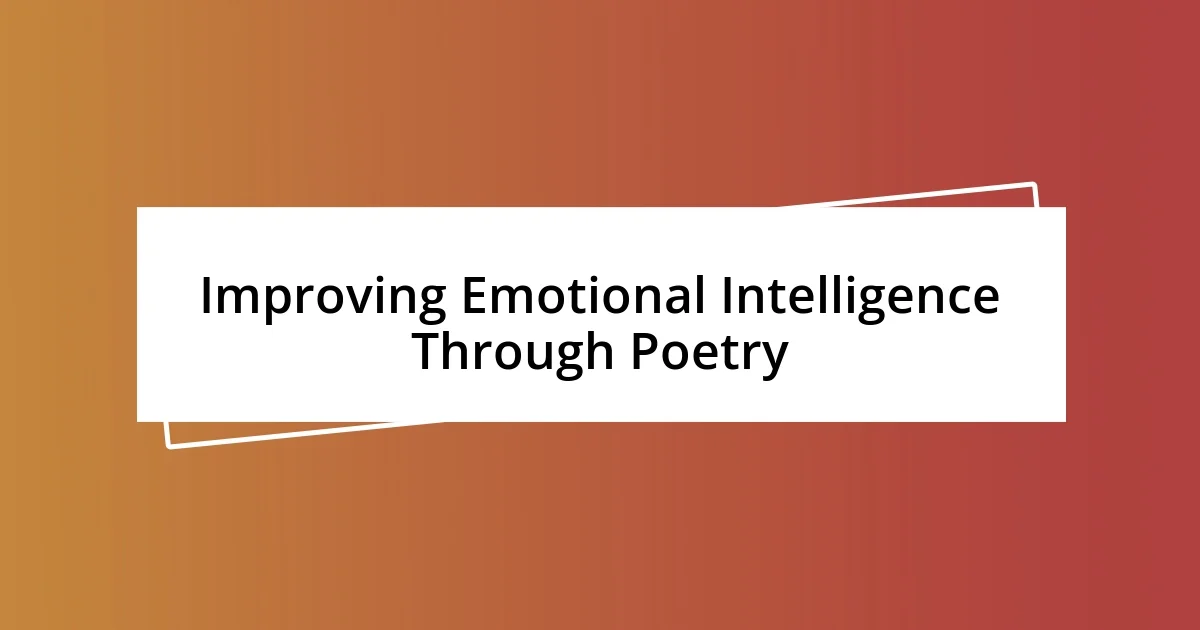
Improving Emotional Intelligence Through Poetry
Engaging with poetry has profoundly impacted my emotional intelligence. I vividly recall the first time I analyzed a piece that explored themes of heartbreak. As I read through the verses, I began to confront my own feelings of sadness—something I had been avoiding for months. This process not only allowed me to empathize with the poet’s experience but also facilitated a deeper connection with my own emotions, leading me to reflect on how I navigate relationships and my responses to them.
Furthermore, the challenge of navigating complex emotions in poetry teaches me to articulate my feelings more effectively. For example, I once struggled to express my thoughts after a tumultuous family event. However, while analyzing a poem about family dynamics, I found the language that eluded me. Understanding the poet’s nuanced emotional expressions helped me to identify my own feelings, from pain to hope, and eventually communicate them more clearly with my family. This skill has proven invaluable, fostering better understanding and connection.
Finally, poetry often serves as a mirror that reflects societal issues and personal experiences. I remember reading a poem centered around identity and belonging, which prompted me to reflect on my own journey. This introspection not only enhanced my self-awareness but also ignited a sense of compassion for others grappling with similar struggles. Ultimately, my ability to navigate my emotions—and to connect with others on a deeper level—has flourished through my engagement with poetry.
| Benefits of Poetry Analysis | Examples from Personal Experience |
|---|---|
| Enhances emotional understanding | Deepened insight during heartbreak analysis |
| Improves communication of feelings | Gained vocabulary through family-themed poetry |
| Fosters self-reflection | Reflection on identity through poetry |
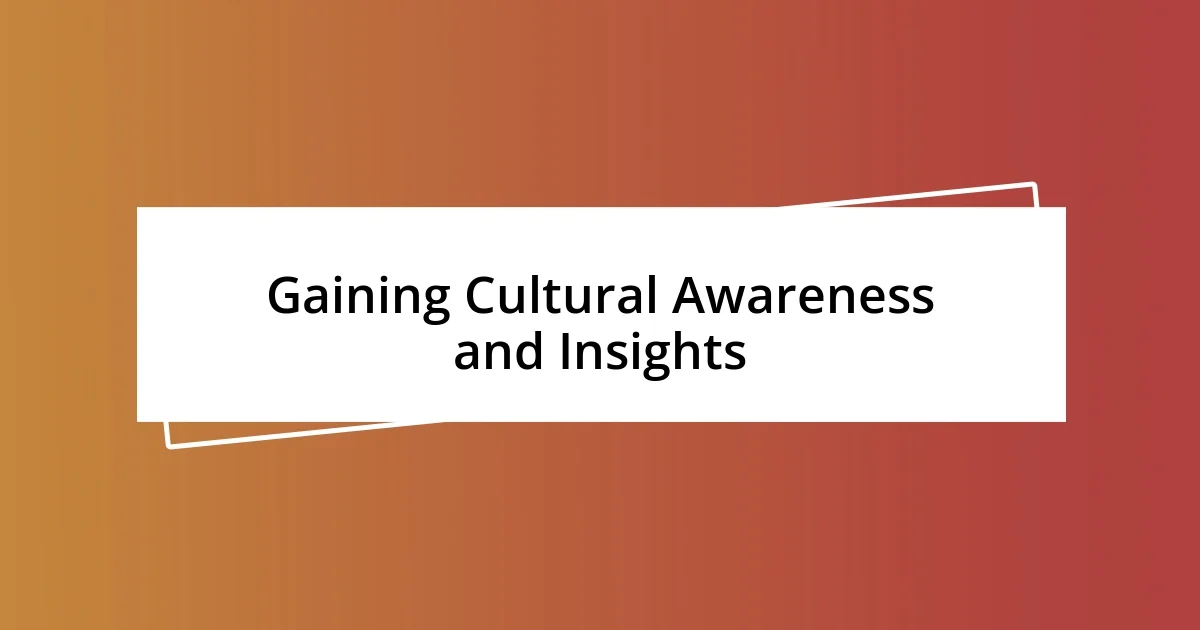
Gaining Cultural Awareness and Insights
Gaining cultural awareness through poetry analysis has been a profoundly enriching experience for me. Each poem offers a window into different lives and perspectives, allowing me to see the world through the eyes of others. I remember diving into a collection of poems from various cultures where the imagery and language opened my mind to customs and traditions I had never explored before. Isn’t it fascinating how a few lines can convey so much about a person’s heritage and struggles?
Moreover, engaging with poetry from diverse voices has pushed me to confront my own assumptions. There was a time when I assumed that the themes of love and loss were universal, but a poem by an indigenous poet challenged that notion. It illustrated the importance of land and community in their experience of grief, which made me realize how context shapes our perception of similar emotions. This awakening not only deepened my appreciation of the art form but also sparked my curiosity about cultural narratives that extend beyond my own.
As I analyze diverse poetic expressions, I find that they serve as rich resources for understanding societal issues and histories. For instance, I once analyzed a poem that highlighted the impact of colonialism on a people’s identity. It struck a chord within me, prompting me to reflect on how history continues to shape present realities. Have you ever felt the weight of someone’s story resonate with your own? That moment of connection has been truly enlightening, as it emphasizes the shared human experience, bridging gaps I hadn’t realized existed.
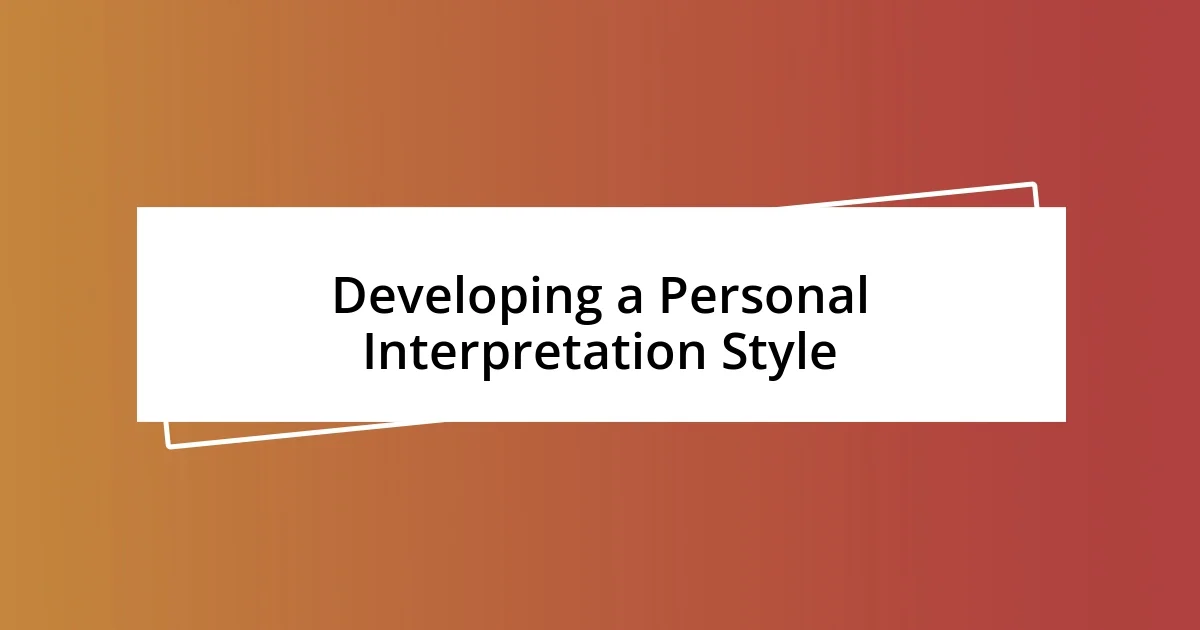
Developing a Personal Interpretation Style
Developing a personal interpretation style in poetry analysis has been a journey of self-discovery for me. Initially, I found myself strictly adhering to conventional interpretations, but I soon realized that my unique experiences and feelings could enrich my understanding of the text. One memorable instance was when I attempted to analyze a poem about resilience. I struggled at first but ultimately found that incorporating my own challenges revitalized my interpretation, making it more relatable and profound.
Throughout this process, I’ve learned that personal connections to the text can unveil layers of meaning that might not be immediately apparent. For example, while exploring a poem that depicted the joy of childhood, I was reminded of afternoons spent in my grandmother’s garden. That nostalgia transformed my analysis, allowing me to appreciate the interplay of light and shadow in the poem differently. Have you ever experienced a moment where your own life resonated with the words on the page? This connection has taught me to trust my instincts as I navigate the nuances of each piece.
What truly excites me about developing my personal interpretation style is the freedom it offers. I no longer feel constrained by the “right” or “wrong” ways to interpret poetry. Instead, I’ve embraced the notion that my interpretation is as valid as any expert’s analysis, given how deeply it reflects my emotions and experiences. I recall the thrill of presenting my perspective on a thought-provoking poem in a workshop and realizing that my interpretation sparked a lively discussion. This realization affirmed that personal insight fosters deeper engagement, creating a dialogue that enriches everyone’s understanding of the poem. Isn’t that the beauty of poetry? It invites us all to share our voices.
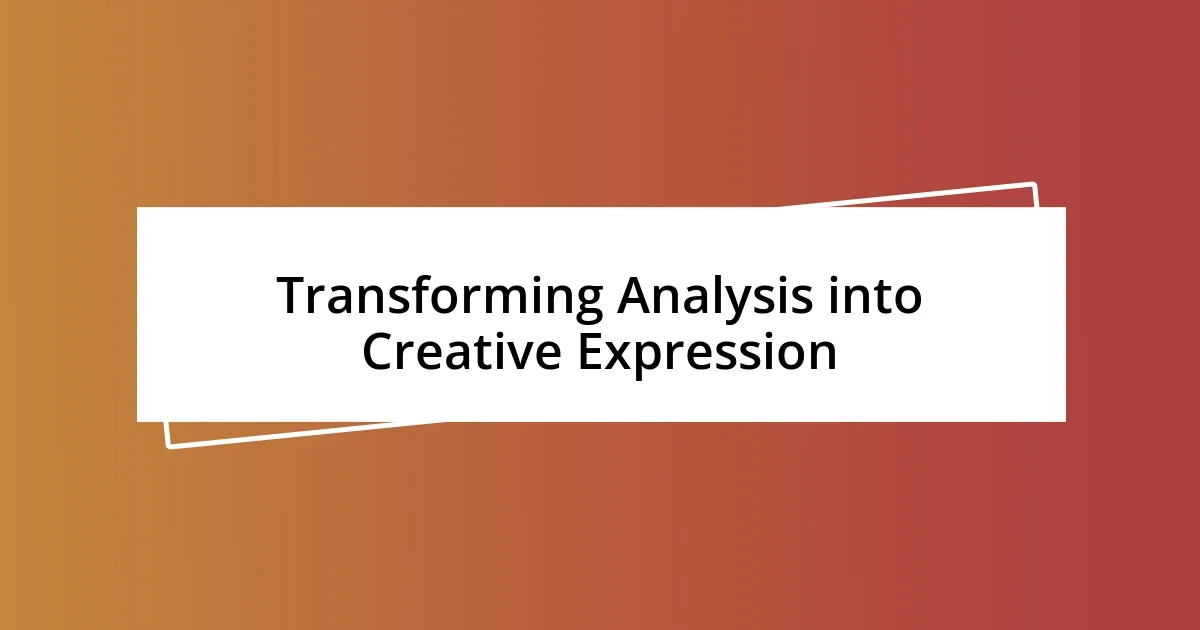
Transforming Analysis into Creative Expression
Transforming poetry analysis into creative expression feels like unlocking a hidden door to my imagination. I still remember when I wrote a poem inspired by an analysis of a classic piece about nature’s beauty. The process of breaking down the original work allowed me to feel the rhythm and imagery more acutely, leading me to craft my own verses that echoed those themes. Isn’t it incredible how a few stanzas can ignite your own creative fire?
As I explored the layers of meaning in various poems, I discovered that each analysis sparked new ideas for my writing. One afternoon, after dissecting a poem that captured the essence of nostalgia, I picked up my pen and let my memories flow onto the page. The act of transforming analytical insights into verses was cathartic, allowing me to express emotions I hadn’t fully articulated before. Have you ever found yourself inspired by a piece of art in a way that compelled you to create something entirely new?
Moreover, I realized that sharing my creative expressions rooted in analysis can cultivate a unique connection with others. I recall sharing a piece I wrote in response to a haunting poem about loss at a local reading. The moment I witnessed audience members nodding and reflecting on my words, I understood the power of poetry—it transcends individual experience and resonates with shared human emotions. This transformation process, flowing from analysis to expression, not only enhances my appreciation of poetry but also invites others to join in a profound dialogue. Who knew that wielding a pen could bring such a sense of community?












